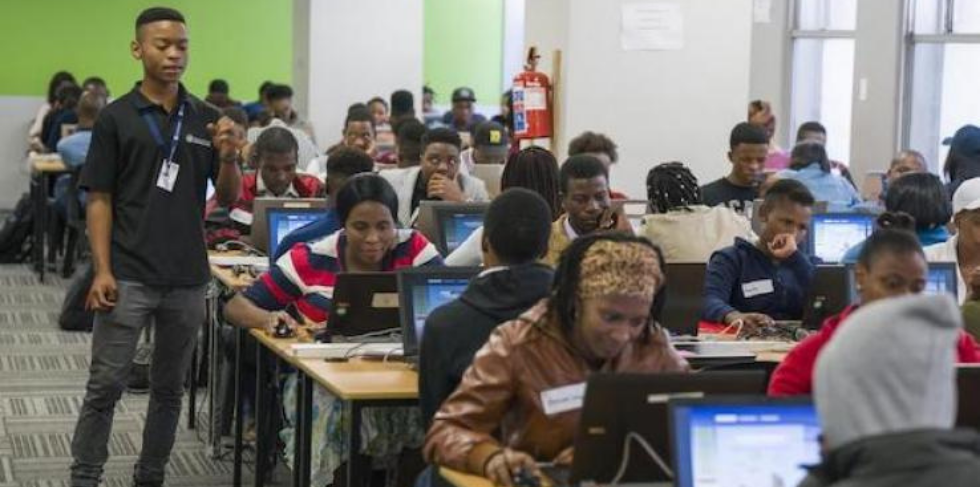Unemployment in South Africa continues to rise, exacerbated by the Covid-19 pandemic. Of those who are unemployed, 63 percent are between the ages of 18-35. Alleviating youth unemployment is a top priority for the South African government, who have responded to this crisis with various labor market programs and policy interventions.
It is also the mission of the Harambee Youth Employment Accelerator, a South Africa-based social enterprise, founded in 2011 to address a mismatch of demand and supply in the youth labor market by connecting employers with first-time job seekers. Harambee serves roughly 200,000 unemployed youth annually and targets young adults between the ages of 18-29 who graduated from high school, are from low-income backgrounds, are currently unemployed, have limited formal sector work experience, and have actively searched for work in the past 6 months.
The J-PAL and Harambee Youth Employment Accelerator Partnership
J-PAL and Harambee have worked closely together over the past three years. This partnership was initially set up to collaborate on a randomized evaluation on the impact of providing information about a job seeker’s skills on firms’ beliefs about their skills, search effort, and employment outcomes. The study found that providing information to job seekers and prospective employers increased participants’ employment and earnings. Job seekers updated their beliefs and strategies for job search, and employers received information they valued.
Informed by this study, Harambee has integrated a modified version of this intervention into their operations. The study results have also informed the researchers’ engagement with government departments that are considering similar interventions.
Additional evidence gathered by J-PAL affiliates is informing Harambee’s reference letter tool for job seekers. In 2015 and 2016, a randomized evaluation by J-PAL affiliates Patrizio Piraino, Martin Abel, Rulof Burger and co-authors highlighted the positive power of acquiring reference letters on job seekers’ job search activities. Attaching reference letters to job seekers’ applications increased employer response rates by 60 percent, an increase largest for women. Using reference letters made women applicants 50 percent more likely to be employed than applicants without reference letters.
In the pre-pandemic period, Harambee used the reference letter template in their in-person and virtual toolkit, and noted that it has been one of the most popular and most utilized tools.
“At Harambee we understand first-hand the importance of being able to signal both one’s skills and work experiences, and the reference letter trial provides convincing evidence of the impact of being able to do so; particularly for young women who face more obstacles than young men in finding work. What’s been great about the trial is that the reference letter itself is simple, practical and most significant for our work—highly scalable. Which means that we’re able to share it with and guide our network of over 1.5 million youth, as we work to improve and smooth their labour market outcomes.” – Rob Urquhart, Harambee Youth Employment Accelerator
Now, Harambee will additionally feature the reference letter template via their website and mobile site, making it available to the 1.5 million users registered on the job seekers database.
Efforts to scale up job search tools in South Africa
The partnership between J-PAL and Harambee has developed into a collaborative effort to scale up various labor market interventions in South Africa. Working together on the scale-up process has involved evidence-sharing between organizations, capacity building by embedding J-PAL staff in the Harambee organization, and facilitating strong relationships with researchers and government officials.
To further promote the uptake of these evidence-based tools, J-PAL Africa disseminated the research findings and shared job search tools with relevant stakeholders in the public and social sectors. In 2019, J-PAL Africa presented evidence from the reference letter study and a separate study on job search action plans to career counselors from provincial Departments of Labour, in the Western Cape and Gauteng, and staff from the Expanded Public Works Programme from the City of Cape Town. Study results have also been presented to various labor organizations such as YES for Youth and the International Labour Organization.
These interventions in job search are scalable, low-cost with significant take-up. Going forward, J-PAL Africa will continue to encourage the adoption of skills certification, reference letters, and action plans in South Africa as well as to support partners in other countries on the continent to adapt and implement these variations, in so far as the results are generalizable. For more information, please contact Ziyanda Stuurman.
Source: Access the original article at https://www.povertyactionlab.org/blog/11-12-21/evaluating-and-scaling-job-search-tools-harambee-youth-employment-accelerator. Published 12 November 2021.





 Stay Connected
Stay Connected



